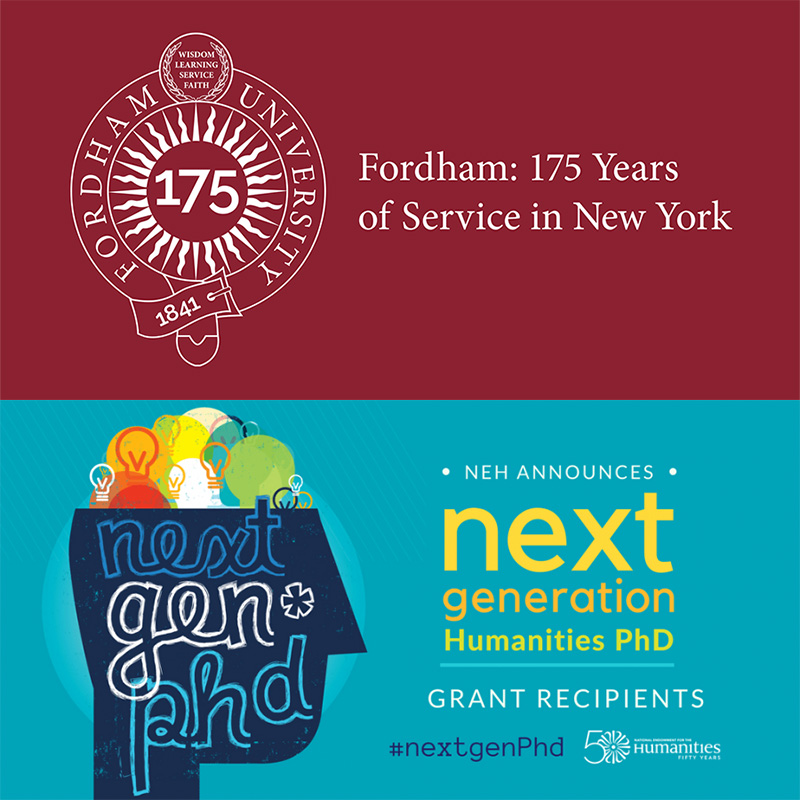“That richness of thought and perspectives really helps our work,” Jonathan Valenti, FCLC ’98, a principal with Deloitte Consulting, told Fordham College at Lincoln Center students in February.
Last fall, Fordham continued the conversation with students by hosting its first-ever Humanities Day, on September 19. “We all know that today, the humanities are under siege in virtually every university in this country,” Brenna Moore, Ph.D., a professor of theology, said at the event. “The logic seems to be we need a stripped down, efficient society. … Today we gather to push back on this pernicious logic.”
Moore is a member of the Fordham Humanities Consortium, which aims to “help our students flourish as they choose majors that seem increasingly countercultural.” The new group organized the Humanities Day gathering in partnership with Fordham’s Career Center. More than 100 students gathered in the McShane Campus Center at Rose Hill to hear from alumni and faculty about the value of studying philosophy, history, and other humanities fields.
In an article for The Chronicle of Higher Education, Martha C. Nussbaum, a professor in the philosophy department and the law school at the University of Chicago, described one of the less tangible benefits she observed while guest lecturing in a required philosophy course at Utah Valley University.
“What I saw was joy,” she wrote of the spirited debate that followed her lecture. “The sort of joy the philosopher Seneca described: not the flighty joy of the partygoer, but a solid inner joy that comes from discovering yourself.”
For Justin Foley, FCRH ’95, GABELLI ’03, who double majored in urban studies and philosophy, it was about learning to think creatively and being open to new paths, which is how he went from working as a tenant organizer to earning a Fordham M.B.A. to becoming a program organizer for the Service Employees International Union.
“Nobody said, ‘Here’s what your career track is going to be,’” he said. “I really learned to indulge my curiosity about the world around me. … My undergrad time has given me a framework for my values.”
—Franco Giacomarra, FCLC ’19, and Adam Kaufman, FCLC ’08
Why did you study the humanities, and what has the experience done for you personally and professionally? Tell us at [email protected].
]]>“Sometimes the classroom can be such a formal atmosphere,” said Moore, who teaches theology at Fordham, along with Seitz, her husband. “Just seeing them lying on the floor with my dog, petting her, and telling us about terrible high school summer jobs they’ve had, just being more human—it was so sweet.”
This summer, Moore served as a faculty mentor to three undergraduates participating in Fordham’s summer research programs: Laura Oldfather, a theology student at Fordham College at Lincoln Center who is revitalizing Ignatian spirituality for a new generation; Amara Overmyer, an English student at Fordham College at Lincoln Center who is writing stories about a local nonprofit; and Christopher Ciaccio, a philosophy student at Fordham College at Rose Hill who is imagining alternatives to capitalism using 20th-century French mystical thought. (The students’ research is, respectively, funded by Fordham College at Lincoln Center, the Center for Community Engaged Learning, and Fordham College at Rose Hill.)
In mid-July, Moore and Seitz invited the students to their home in Hastings-on-Hudson for dinner, along with their theology colleague Stephanie Arel. While eating a homemade meal prepared by Moore—roasted chicken, potatoes, goat cheese salad, and watermelon—the students and scholars shared their research and the things they care about.
“They all are readers, writers, and thinkers who are doing super cool work this summer, and it was great to have a chance to think and learn together,” said Moore, who hosted students at her home last spring, too.
Ignatian Spirituality for Gen Z
Oldfather, who is originally from Wisconsin, is a theology major. She said she is studying how scholars are adapting the spiritual exercises of St. Ignatius of Loyola to different cultures and audiences, particularly women, who were “often left out of the history of the Jesuits.”
“I’m looking at the work that people have done … and focusing on how this impacts a modern-day Fordham college student, like how the exercises would be applicable. As part of my research, I am writing a translation, updating some of the language. A lot of it is changing pronouns in places, making it gender-neutral. In some places, the language is very imperial or colonial, just because of the context of it being written in the 1500s,” said Oldfather, who will present her research at Fordham’s spring symposium next year.
An Internship That Combines Writing and Humanitarian Work
Overmyer, an English student from California, is a summer intern at an East Harlem nonprofit that helps vulnerable families and children, where she is developing website biographies for the organization’s nearly 60 staff and board members.
At the dinner, she shared her work with the other students, who, in turn, broadened her perspective on theology and philosophy. (Her favorite part of the get-together, however, was meeting Moore and Seitz’s three-and-a-half year old golden retriever, Mosey: “I have slobber and hair all over my skirt that I wore that day, but it was worth it,” she said.)
Moore said that she and her husband love seeing students in their “full humanity.”
“We are, as humanities scholars and lecturers and students, studying human culture and civilization,” said Moore, “and it’s so much more interesting to do that when we show up in our full humanity, too.”
]]>The group—a professor, a psychologist, and three students—gathered in a classroom in Duane Library on Feb. 14, where they spoke to members of the Fordham community about how love appears in their professional work.
Literature on Love
Some of them shared their favorite literature on love. Thomas O’Donnell, Ph.D., associate professor of English and medieval studies, printed out three poems and passed out copies to the audience: a joyful poem written by Comtessa de Dia, a 12th-century French noblewoman; a mournful poem by Umm Khalid, an Arabic poet from the 8th or 9th century; and a funny poem by Geoffrey Chaucer, a 14th-century English poet.
“[Chaucer] says he is so in love that he feels like a piece of roasted fish in jam sauce,” O’Donnell said, to laughter from the audience.
Asher Harris, a Ph.D. student in theology, talked about American jazz musician John Coltrane, who expressed love and gratitude to God for saving him from his heroin addiction. The most open expression of this love appeared in his album A Love Supreme, particularly in the song “Psalm,” said Harris, who played a recording for the audience.
Another scholar, Christopher Supplee, FCRH ’25, a creative writing major, shared a poem he wrote and recited in honor of the event: “A World Without Love.”
“There are matters that cannot be mended by mortal hands alone,” he said to the audience, reading from his poem. “That only miracles may fix, assuming they still exist.”
Supplee said that when he was writing his poem, he was inspired by the question “What is love?”
“It made me want to sit down and think about what love means to me—what are my experiences, what I’ve read, what I’ve been taught from scholars, writers, and entertainment,” Supplee said. “Love can be expressed in many different ways, whether it be through justice, romance, or friendship.”
Queer Love at Fordham
Other scholars shared their own research on love. Benedict Reilly, a senior at Fordham College at Rose Hill who studies theology, discussed the theme of love from his book Queer Prayer at Fordham. He started the book project two years ago, interviewing LGBTQ+ members of the Fordham community about how they pray. During those conversations, he learned about the connection between prayer and love. One interviewee said that she learned to love herself through prayer. Another interviewee—an asexual and aromantic woman who longed to have a child of her own—spoke about how she found love and comfort through a Hail Mary.
“I’m sharing all of these with you because I want you to think about different prayers or songs that might be helpful to you all as you fall in love,” Reilly said.
The final invited speaker, Sarika Persaud, Ph.D., a supervising psychologist in Counseling and Psychological Services who specializes in love and relationships, spoke about what her work has taught her about love.
“When I’m sitting with a person and helping them heal, I’m not only opening them up to love as a feeling, to feel love again, but to love as who you are—to exist in the world as love,” said Persaud, who added that her Hinduism philosophy informs her work. “All of your desires, whatever relationships you enter into, whatever relationships come your way, whatever challenges come your way, they’re all opportunities … to love more.”
What Love Means to a Jesuit
After each guest spoke, event host and theology professor Brenna Moore invited the audience to reflect on what love means to them.
Among them was Timothy Perron, S.J., a Jesuit in formation and doctoral student in theology.
“As somebody who has taken a vow of celibacy, a lot of times, people think, ‘What could that person know about love, especially romantic love?’” Perron said. “But actually, I’ve thought about it a lot.”
Before he decided to become a priest, he wondered if he could commit to that vow. After much thought, he said he realized that every human has the same needs and desires, but they appear in different ways.
“I still have a need for close friendship, intimacy, love, and care for others … [but there are]all of these different ways that love could be understood,” Perron said. “If I see somebody who is looking for money or something, I’ll often stop and talk to them or take them to the nearest deli … Just stuff like that, where you feel that love and that connection … intentionally developing close relationships with people, keeping in close touch, calling them—all of those sorts of things, I think, are part of what love means.”
]]>“Instead of, ‘Oh, I see from your chart that you have congestive heart failure, so tell me how your breathing is,’ I started by rolling my chair away from the computer, putting my hands in my lap, not writing, not typing, and said: ‘I will be your doctor, so I need to know a lot about you. Tell me what you think I should know about your situation,’” Charon recalls.
“One woman replied, ‘You mean you want me to talk?’ That tells you something about her prior experience with doctors.”
Charon, a 1970 Fordham graduate, is the founder of narrative medicine, which calls for listening to patients’ personal stories and responding in ways that enhance their care. A Harvard-trained physician and a literary scholar, she is a professor of medicine and the founding chair of medical humanities and ethics at Columbia University.
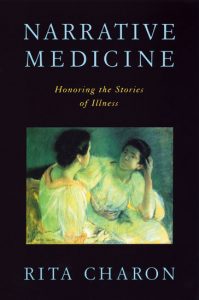
When patients are invited to share their stories, they often provide a lot of information and context. “One woman said, ‘Well, I didn’t tell you about the fire in our house in Panama,’ which turned out to be really pivotal for this patient. Or, ‘I didn’t tell you that my daughter is in prison,’ or ‘I didn’t tell you that I was in prison, but here, I brought you a book of poems that I wrote while I was in prison,’” Charon says.
Nonverbal cues are also important, she adds. “As I’m gathering everything I might come to know about this person, I’m listening to her words. I’m looking at her face. I’m noticing her gestures. I’m noticing the smell of her body. I’m reacting to any kind of emotional cues that may or may not be said, all that stuff.”
Charon quickly realized that having the doctor and patient work together to better understand the patient’s condition added value to the typical topline diagnosis. “Some physicians, especially those in the surgical specialties, will say to me, ‘Rita, I leave that for the social workers. I need to find out if the patient can bear weight on the new hip.’ Well, do that, but let’s also address the problem that the patient came to us for help with. And sometimes it’s a social problem. Sometimes they can’t afford the medicine, so they don’t take it. Sometimes it’s, ‘I didn’t want to tell you how much alcohol I drink.’
“With this approach,” she says, “we have a better shot from the start in addressing the problems that the patient herself considers problems, and not restricting that to things that have diagnostic codes.”
‘A Person Who Questions How Things Are Done’
While medicine ran in her family—Charon’s father was a family doctor, and one of her grandfathers was a physician as well—she didn’t plan to follow the same path. She describes her college-age self as a young Catholic kid from Providence, Rhode Island. “My parents let me come to New York only if I’d study with the Jesuits,” she recalls. She began her undergraduate studies at Thomas More College, Fordham’s liberal arts college for women at the time, but switched to the University’s experimental Bensalem College and was part of its inaugural class in 1967. (The college closed in 1974.)
At Bensalem, she says, “we took very seriously questions like, how do you learn, and what is learning? It helped me to become a person who questions how things are done, especially in terms of how we learn and how we grow.”
Charon went on to medical school at Harvard, but returned to New York City for her residency at Montefiore Hospital and became interested in the ideas of the bioethicists, historians, and other scholars working in what came to be known as the medical humanities.
During her residency, the work of Henry James captivated Charon so much that what began as a side interest turned into a doctorate at Columbia University. “I became a literary scholar and an internist at the same time,” Charon says. “My study of literature made me a different kind of doctor, and I realized also that what I knew about medicine contributed to the study of literature.”
‘Letting People’s Voices Be Heard’
In the 20 years since Charon coined the term, narrative medicine has been adopted more and more widely; Columbia, Temple University, Ohio State, and other institutions have begun narrative medicine programs. Charon’s research has won funding from both the National Institutes of Health and the National Endowment for the Humanities, and she is the author of the book Narrative Medicine: Honoring the Stories of Illness (Oxford University Press, 2006). Her workshops attract people from across disciplines.
“I’ve found that when I’m able to enact these narrative techniques with patients and families, I feel a stronger bond with them,” says Dr. Daniel Eison, an oncology hospitalist at Children’s Hospital of Philadelphia who studied narrative medicine with Charon. “Narrative medicine is even more important for patients from a racial, religious, or socioeconomic minority. They’re very disempowered in these settings, and narrative medicine seeks to acknowledge the power differentials and level the field a little bit by letting people’s voices be heard.”
As part of the fight against the novel coronavirus, Charon has been making more narrative medicine resources available to caregivers and working to help clinicians and medical students reduce their social isolation using online tools.
“We’ve had a robust international response to these training sessions,” Charon says. “The creative work they are able to do and the responses they receive from their writing is soul-building, and led one emergency department physician to tell us, ‘I was able to breathe for the first time all week at your session.’”
—Chris Quirk is a freelance writer based in Brooklyn.
]]>The University Research Council presented the Outstanding Externally Funded Research Awards (OEFRA) to recognize the high quality and impact of sponsored research within the last three years and its enhancement of Fordham’s reputation—both nationally and globally.
Honorees in five separate categories included:
Sciences: Silvia C. Finnemann, Ph.D., professor of biology
Since joining Fordham University in 2008, Finnemann has secured over $3.65 million in grants from the National Institute of Health, the Beckman Initiative for Macular Research and the Retinal Stem Cell Consortium of New York State for her research on healthy eye function and age-related changes to eye cell function. These grants enable her to support a thriving laboratory where she has a team of graduate and undergraduate students and post-doctoral researchers.
Social Sciences: Celia B. Fisher, Ph.D., The Marie Ward Doty University Chair in Ethics and professor of psychology
Fisher has earned 12 major research awards and over $11 million from federal agencies over the past 20 years for her work in HIV and substance abuse prevention and research ethics. Recent awards have come from the National Institute on Drug Abuse, the National Institute of Child Health and Human Development, and the National Institute on Minority Health and Health Disparities.
Humanities: Stephen R. Grimm, Ph.D., professor of philosophy
Grimm was awarded $4.5 million by the John Templeton Foundation and the Henry Luce Foundation to lead a three-year interdisciplinary initiative called “Varieties of Understanding: New Perspectives from Psychology, Philosophy, and Theology.” His grant is the largest externally funded research award in the humanities in Fordham’s history.
Interdisciplinary Research: Jennifer L. Gordon, professor of law
With grants from the Ford Foundation and the Open Society Foundation, Gordon pursued a three-year initiative to combat abuse and trafficking of Mexican migrant workers recruited to work in the United States. Partnering with the Mexican human rights organization ProDESC, she has developed a transnational pilot program set to launch this year to implement recommendations that have arisen from her research.
Junior Faculty Research: Marc N. Conte, Ph.D., assistant professor of economics
Conte received nearly $500,000 from the National Institute of Food and Agriculture, a division of the U.S. Dept. of Agriculture. In collaboration with a researcher from the University of Nebraska, he is using the grant to study how behavioral economics can improve auctions that induce farmers to set aside land for conservation and biodiversity.
In opening the ceremony, Joseph M. McShane, S.J., president of Fordham, lauded the honorees for the fearless inquiry of their academic research, particularly at a time when truth and wisdom are being devalued in our society.
“Research is at the center of the academic enterprise,” he said, “enriching not only the Fordham community, but the community of the United States and of the world.”
Organized by the Office of Research and the University Research Council and sponsored by the Bronx Science Consortium, the daylong event also included grant education workshops, a forum of university researchers, and a keynote address by Dr. Walter L. Goldschmidts, Ph.D., vice president and executive director of the Office of Sponsored Programs at Cold Spring Harbor Laboratory.
-Nina Heidig
]]>Fordham is one of 28 colleges and universities to win a Next Generation PhD matching grant, which aims to overhaul doctoral programs in the humanities to better prepare students for 21st-century job prospects within and outside of academia.
“The future of doctoral training in the humanities depends on innovative models that will deliver the competencies and skills that doctorate holders need to succeed in a variety of career pathways, in addition to traditional faculty lines,” said Eva Badowska, PhD, dean of GSAS and grant director, alongside co-director, Matthew McGowan, PhD, associate professor of classics.
“As a graduate school within a Jesuit university recognized for its strengths in the humanities, GSAS is uniquely situated to ask what it means truly to prepare our doctoral candidates for the fast-changing world of higher education and for the new knowledge economy,” Badowska said.
Historically, doctoral programs have prepared graduates solely for work in academia. However, with a 30 percent decline in academic job postings in the humanities since 2008, this singular focus is no longer realistic for students graduating from these programs.
“Thousands of professors are currently in the business of preparing thousands of graduate students for jobs that don’t exist,” Leonard Cassuto, PhD, professor of English and a collaborator on the project, said in his recent book, The Graduate School Mess: What Caused It and How We Can Fix It (Harvard University Press, 2013).
The $25,000 planning grant, to be matched by an additional $25,000 from GSAS, will not only propose rethinking Fordham’s five doctoral programs in the humanities (classics, English, history, philosophy, and theology), but will also examine what a 21st-century PhD program at any institution should encompass. For instance, what advanced transferrable skills should be taught at the doctoral level? Should skills such as collaborative teamwork and advanced digital proficiency be treated on a par with traditional emphases, such as mastery of field-specific knowledge and independent research skills?
In addition to Badowska and McGowan, the project includes a Core Planning Group and Constituent Advisory Group comprising GSAS faculty, current doctoral candidates, alumni, and community leaders who would benefit from hiring graduates with doctoral-level expertise.
At the end of the academic year, the group will produce a white paper detailing the proposed model.
“We want to rethink how we deliver the PhD at our University, but also make it scalable to other institutions and humanities programs,” said Melissa Labonte, PhD, associate dean of GSAS and associate professor of political science. “To do right by the students in these programs, we need to rethink the entire model. This planning grant will allow us to begin this process.”
A key part of the grant will address making doctoral programs in the humanities more inclusive of underrepresented, underserved, and marginalized communities, Labonte said. Within these groups, the percentage of students who enroll in a doctoral-level program has dropped precipitously in recent decades.
“We’re trying to find ways to counter this trend,” Labonte said. “This part of the grant falls very much in line with Fordham’s mission. If we’re going to embrace progressivism and social justice models, then we have to think about how PhD programs in the humanities will address the needs of people from underserved communities.”
The NEH announced the Next Generation PhD grants winners on Aug. 9 as part of $79 million in grants for 290 humanities projects and programs across the country, an initiative the group undertook to mark its 50th anniversary year.
]]>Funded by a $4.2 million grant from the John Templeton Foundation, the Varieties of Understanding project came to a close on June 24 with the capstone conference drawing multidisciplinary international scholars to the Lincoln Center campus. The three-year project has underwritten research in the fields of philosophy, psychology, and theology on the question of how we understand the world.
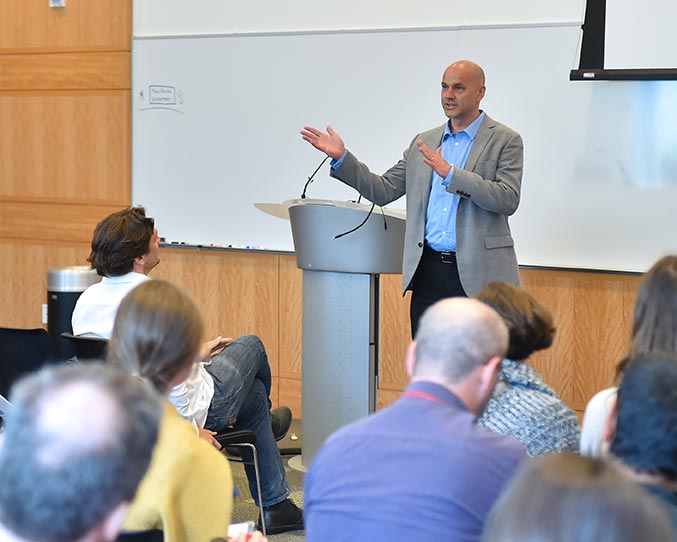
Photo by Dana Maxson
The scholars who participated in the project have collectively generated significant research in their respective fields, Grimm said. Ten books were accepted or published by major printing presses, including Oxford University Press and Harvard University Press, and 52 journal articles were published or accepted in journals, including Nous, Cognition, Child Development, Behavioral and Brain Sciences, Faith and Philosophy, and Philosophical Studies—with more than 40 more articles currently under review.
“We have helped found a new field of inquiry, the study of understanding,” said Grimm. “This vibrant new field has led to more inquiry, more discussions, more debates, all of which are helping to increase our understanding of understanding itself.”
Grimm produced four papers for the project and will continue his research this fall as a visiting fellow at Clare Hall at the University of Cambridge. Among his research interests are two different kinds of understanding: one by which we “grasp” the world, and another that the world presents to us.
“One of the capstone speakers, Jennifer Gosetti-Ferencei, said that you read well when you let the novel or the poem grasp you—you’re not trying to grasp it or tinker with it. You’re being receptive to it, looking to see what it is pointing out to you,” Grimm said.
“There are some kinds of knowledge that we ‘grasp,’ such as the causal structure of the world. But then there are things like literary understanding that is more receptive and attentive. That’s a different kind of understanding.”
The Limits of Understanding
The capstone conference, which ran from June 22 to 24, featured several eminent researchers, including Ernest Sosa, PhD, the Board of Governs Professor of Philosophy at Rutgers University; Anthony Gottlieb, former executive editor of The Economist; and Frank Keil, PhD, the Charles C. and Dorathea S. Dilley Professor of Psychology and Linguistics at Yale University.Pulitzer prize-winning novelist and essayist Marilynne Robinson’s plenary talk, “How We Talk!” cautioned against becoming overconfident in our capacity to understand. She focused on academia’s use of scrupulously precise and reductionistic language, which she said gives an air of communicating truth.
Language, though, is “complex and endlessly open to new complications,” she said, “more like a brilliant companion of humanity than its creation.”

Photo by Dana Maxson
“It’s like living with a creature, like a cat or something. You begin to find out it has its own ways of operating, that you can’t coerce it or control it,” she said. “We know language is alive, because it can be lifeless. It dies in captivity.”
Language is taken captive when academia—particularly social sciences, Robinson said—clings to jargon for the sake of being precise. Often, that precision becomes conflated with truth, leading us to overestimate just how much we actually understand about a given subject. Respecting the complexity and vitality of language keeps us intellectually humble, she said.
A Multi-University Effort
The $3.56 million Templeton grant and more than $640,000 in supplemental funds were used to distribute approximately $2.6 million in subawards to fund new research on the psychology, theology, and philosophy of understanding. Twenty projects were selected from nearly 400 proposals.
Tania Lombrozo, PhD, associate professor of psychology at the University of California, Berkeley; Michael Strevens, PhD, professor of philosophy at New York University; and Gordon Graham, PhD, the Henry Luce III Professor of Philosophy and the Arts at Princeton Theological Seminary directed the distribution of awards for psychology, philosophy, and theology, respectively.
Lombrozo directed empirical and theoretical research out of her Concepts and Cognition Lab at the University of California, Berkeley on the psychology of human understanding. Her team conducted a survey of how people generally view the ability of science to understand. Most people, the team found, believe that science is limited to empirical data.
In other words, science is useful for elucidating the world around us, but it fails when it comes to explaining phenomena such as romantic love or religious beliefs.
For a full description of the project, visit the Varieties of Understanding website.
]]>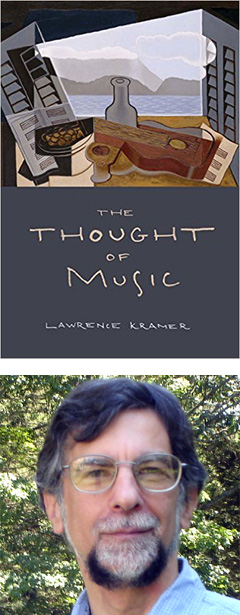 Kramer, a prizewinning composer and Distinguished Professor of English and Music, argues in his new book The Thought of Music (University of California Press, 2016) that music is not just an expressive outlet, but a legitimate mode of thinking about the world.
Kramer, a prizewinning composer and Distinguished Professor of English and Music, argues in his new book The Thought of Music (University of California Press, 2016) that music is not just an expressive outlet, but a legitimate mode of thinking about the world.
The book is the final installment in a series of three, which includes Interpreting Music (2010) and Expression and Truth: On the Music of Knowledge (2012).
“The volumes together seek to answer three fundamental questions,” Kramer said. “First, what does understanding music consist of? Second, what does understanding music tell us about the character of humanistic understanding in general? And finally, what kind of knowledge does such understanding produce?”
The Thought of Music examines how we think about music and how we think by means of music, questions that Kramer said harken back to Beethoven’s definition of music as “thinking in tones.” Beyond being a means of expression, music can function as a way of thinking about critical human issues such as memory, language, pleasure, rationality, and sexuality, which are just some of the topics addressed in the book.
Elucidating the role that music plays in human thought is particularly important for the field of musicology, the academic study of music. Through the trilogy, Kramer’s goal is to bring music—particularly classical music—into broader conversations within the humanities about ideas such as meaning, identity, society, and culture.
“In the book, the notorious fact that it is difficult to specify what music means becomes a positive force rather than a disability,” Kramer said. “Music [is an example]of the difficulties posed by humanistic knowledge—a form of knowledge that, beyond raw data collection, always involves cognitive uncertainty.”
]]>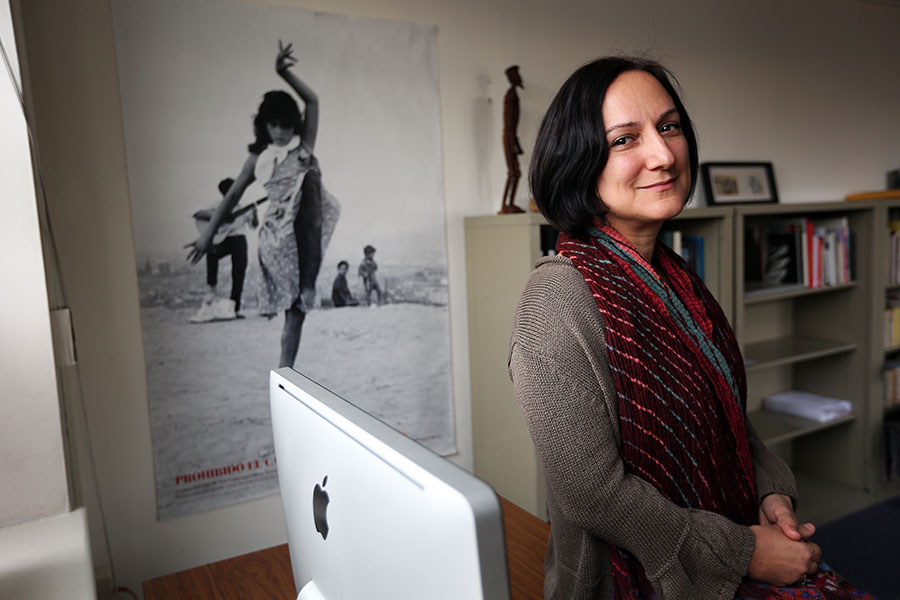
Photo by Bruce Gilbert
The grant will allow Lise Schreier, PhD, an associate professor of French, to devote the 2016-17 academic year to completing research on her forthcoming book, The Playthings of Empire: Child-Gifting and the Politics of French Femininity.
“A grant such as this is significant for the Department of Modern Languages and Literature because it makes us visible as strong researchers,” said Schreier, whose specializations include 19th-century French literature, French colonialism, and race and racism.
“We are a research-oriented department with a variety of courses. Teaching language is a pathway to understanding various cultures.”
Schreier, a native of Saint-Étienne, France, is studying the 18th-century phenomenon of child-gifting, the practice of purchasing or kidnapping dark-skinned children in Senegal, Algeria, India, and the Ottoman Empire as travel souvenirs and fashion accessories for upper-class French women.
Archival material about child-gifting is scant, and few scholars have undertaken research on the practice. Schreier’s own investigation has required some creative thinking as she shifted from letters to literature to artwork searching for clues of these children’s existence.
Some evidence came from mentions of the children in letters between wealthy French women. “Other information comes up in places like letters to tailors, which shows how these children were dressed, where they lived in the castles, how much money was spent on them,” she said.
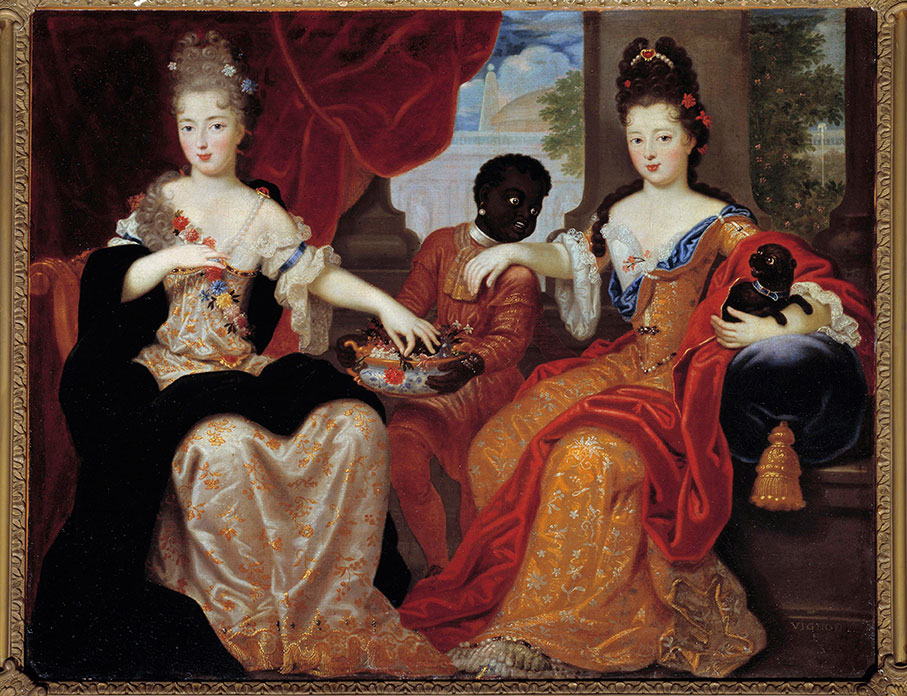
Schreier is also interested in later references to child-gifting that appear in books assigned to French schoolchildren, which often involved a young character who was given a dark-skinned child as a gift. She argues that even after the abolition of slavery in France, when the actual practice of child-gifting ended, these stories served to inculcate colonial ideals in young French citizens.
The message of the books, Schreier said, was that “the French had to raise their children in such a way as to make them good, strong colonial citizens. This started in schools—particularly with girls, who were used to reading books about dolls, reading how to interact with a doll, raise a doll, educate a doll.
“These young readers, already used to being responsible for a doll, would be given a book in which an African boy was gifted to a French child in place of a doll. The inference they were expected to make was that it was normal to take care of a black child, just like a doll. When they’re older, it was hoped, they’d already be used to thinking of colonial subjects as their responsibility.”
This also points to the significant role that women played in advancing French colonialism, Schreier contends.
“From paintings of Old Regime noblewomen adorned with flattering attestations to their wealth, to 1870s moralistic novels featuring women advancing the Third Republic’s ‘civilizing mission’ with the loyal help of their dark-skinned charges, the child-gift motif articulated evolving models of femininity in a trans-national France,” she wrote in the grant narrative.
The NEH is an independent federal agency created as a result of the National Foundation on the Arts and the Humanities Act of 1965. Of the more than 1,200 applications each year, less than 7 percent of applicants receive one of the coveted grants.
]]>The event is called THATCamp Digital Writing, billed as an informal, participatory “unconference” where people learn to use various digital tools and platforms.
“From tweeting to multimodal research papers to Prezi, writing these days means more than just black text on a white background,” says the event’s website. “Through workshops and discussions, THATCamp Digital Writing aims to deepen and advance our notions of all facets of composition.”
Anyone who wants to go should register on the THATCamp website. The event will run from 8:30 a.m. to 6 p.m. on May 3, and participants should check in that day on the 12th floor of the Lowenstein building.
THATCamp stands for The Humanities and Technology Camp. It is not an organization; it is, rather, a name and logo that are licensed to those who want to hold a THATCamp event. The Fordham event is sponsored by the office of Michael Latham, Ph.D., dean of Fordham College at Rose Hill, and co-organized by Elizabeth Cornell, Ph.D., a Fordham IT communications specialist.
The event is being kicked off the day before—Friday, May 2—with a 4 p.m. talk at the John Jay College of Criminal Justice by two experts: Matthew K. Gold, associate professor of English and digital humanities at City Tech and the Graduate Center, CUNY, and James J. Brown, assistant professor of English at the University of Wisconsin-Madison, who teaches in the university’s digital studies program.
]]>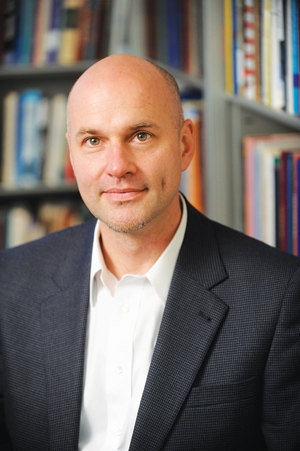
Photo by Chris Taggart
Grimm’s award is the largest that Fordham University has ever received in the humanities. It will fund an interdisciplinary initiative, “Varieties of Understanding: New Perspectives from Psychology, Philosophy, and Theology.” Starting July 1, 2013, the three-year endeavor will sponsor research, in these three fields, into the various ways in which human beings understand the world.
“As human beings we have a natural desire to understand the world and our place within it… But what exactly is understanding?” said Grimm, a philosopher who specializes in epistemology.
Understanding, he said, is a high-level cognitive accomplishment that falls within the broader category of knowledge. While someone who has knowledge of a subject might simply believe a collection of facts about it, someone who understands is able to see how these facts relate to one another and to the larger picture.
“In the contemporary world, we’re constantly flooded with information, and any bit of additional information you’re interested in can usually be found by going online or checking your smartphone. But what I think is especially important is how these bits of information connect or hang together, and I think the ability to discern these connections is something we’re in danger of losing.”
Research generated from the Varieties of Understanding project will explore such topics as which cognitive mechanisms are needed for understanding, how understanding of the world changes over time, and how historical, literary, or religious understanding differs from scientific understanding.
The project will use the grant, in part, to distribute approximately $2 million in Requests for Proposals (RFPs) to fund new research on the psychology, philosophy, and theology of understanding.
Tania Lombrozo, Ph.D., assistant professor of psychology at the University of California, Berkeley; Michael Strevens, Ph.D., professor of philosophy at New York University; and Gordon Graham, Ph.D., the Henry Luce III Professor of Philosophy and the Arts at Princeton Theological Seminary, will direct the distribution of RFP awards for psychology, philosophy, and theology, respectively.
In addition, Lombrozo will receive funding to direct empirical and theoretical research out of her Concepts and Cognition Lab at the University of California, Berkeley, on the nature of human understanding.
Bringing these disciplines together, Grimm said, will activate dialogue to provide a better sense of how humans understand the world.
“Despite avenues of important research, psychologists have yet to attempt to integrate their work into something like a unified account of understanding. And while philosophers have recently begun to examine these issues more closely, a number of big questions have barely been explored at all,” Grimm said.
“For example, in what ways does the understanding provided by the sciences differ from the understanding provided by other areas, such as philosophy or mathematics or history? And if different types of inquiry provide different forms of understanding, how might they be combined to produce an integrated understanding of the world?”
The grant will also fund two conferences over the course of three years. In June of 2015, a mid-point conference will take place at Fordham’s Lincoln Center campus. At this conference, the recipients of RFP awards will present their research in psychology, philosophy, and theology.
In June of 2016, a capstone conference will be held at the Lincoln Center campus, at which all final research results will be presented. In addition, leading scholars and public intellectuals in the fields of psychology, philosophy, and theology will present their own views on the nature of understanding in light of the RFP research presented at the mid-point conference.
“We hope that relationships will be formed among [the scholars]so that interdisciplinary projects will continue,” Grimm said. “We also hope that bringing prominent capstone speakers to comment on the research will attract attention so that new work will flow out of this.”
Over the course of three years, Grimm plans to produce three interconnected articles about understanding and an article about the prospects for a single integrated understanding of the world.
“That will be the hardest question of all, and that’s the reason why a small [effort]wouldn’t make any headway on it,” Grimm said. “I’m optimistic that bringing together psychologists, philosophers, and theologians will make some progress. But I think only a big venture like this has the promise of doing so.”
The John Templeton Foundation is a philanthropic organization dedicated to discoveries related to “the Big Questions of human purpose and reality.” The foundation supports research on subjects ranging from complexity, evolution, and infinity to creativity, forgiveness, love, and free will, and encourages interdisciplinary dialogue.
]]>